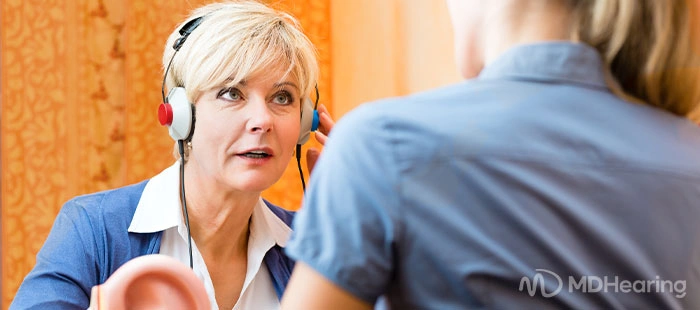If you or a loved one are experiencing hearing issues, there could be a number of causes. With so many types of hearing loss, it can be confusing and intimidating to seek help. However, many treatment options are available for people with difficulty hearing, whether in conversations, on the phone, or in noisy environments.
While hearing loss can occur at any age, it’s most prevalent among older populations. According to the National Institute on Deafness and Other Communication Disorders, the following age groups show high levels of hearing loss:
- Between 65 and 74 years old: about one in three has a hearing loss
- Over 75 years old: nearly half have difficulty hearing
However, not all hearing loss is the same—the type and treatment depends on what part of your hearing is damaged. In this article, we'll give you an in-depth overview of the three main types of hearing loss: sensorineural, conductive, and mixed.
Sensorineural Hearing Loss
The onset of sensorineural hearing loss (SNHL) appears in approximately 66,000 people each year in the U.S. This type of hearing loss is often called “nerve hearing loss.” It stems from damage to the auditory nerve (connects the ear to the brain), hair cells (transmit sound in the inner ear), or both.
In most cases, acquired sensorineural hearing loss worsens gradually, although it can happen suddenly as well. In contrast, congenital hearing loss occurs before birth.
You can experience SNHL in one ear (unilateral) or both ears (bilateral). It can involve high, middle, low, or all three sound pitch levels. The degree of hearing loss—mild, moderate, moderately-severe, severe, or profound—depends on the type and level of damage.
Sensorineural hearing loss has many causes, including aging, excessive noise exposure, diseases (multiple sclerosis, Meniere’s disease), viral infections (meningitis, mumps, measles), head and ear injuries, and inherited genes. Of all types of hearing loss, this one is usually permanent. Therefore, treatment options are typically limited to hearing aids, hearing implants, assistive listening devices, captioning technology, and lip-reading.
Let's go over different types of sensorineural hearing loss:
High-Frequency Hearing Loss
People with high-frequency hearing loss have trouble hearing high-pitched sounds. These sounds fall between 2000 to 8000 Hertz (e.g., electronic beeps, children’s voices). This hearing loss results from damaged hair cells in the inner ear. Symptoms and treatment vary depending on the degree of hearing loss.
Causes of High-Frequency Hearing Loss
- Aging
- Trauma
- Loud noises
- Genetics
- Ototoxic medications
Symptoms of High-Frequency Hearing Loss
- Voices seem muffled
- Words are indistinguishable
- Certain sounds are inaudible
Presbycusis
Presbycusis (age-related hearing loss) is a common type that most people experience. As you age, you typically start losing the ability to pick up high-frequency sounds. Over time, it may be hard to hear low and middle frequencies. Age-related hearing loss primarily originates in the inner ear, but can also be from changes in the middle ear and nerve pathways. Symptoms can vary widely due to other factors in addition to aging.
Causes of Presbycusis
- Aging
- Damaged hair cells
- Loud noises
- Genetics
- Health conditions (e.g., diabetes, heart disease)
- Certain medications (e.g., aspirin, antibiotics)
Symptoms of Presbycusis
- Speech appears slurred
- "S," "th," and similar high-pitched sounds are hard to distinguish
- Background noise makes it difficult to have conversations
- Women and children are hard to understand
- Sensitivity makes sounds seem loud and irritating
- Tinnitus (ringing in the ears)
Auditory Neuropathy
Auditory neuropathy is a hearing disorder where the inner ear can detect sound, but the signal doesn’t reach the brain. You can get this hearing loss in adulthood, but it’s more common in children. Diagnosing auditory neuropathy usually requires a combination of hearing evaluations, particularly for children.
Causes of Auditory Neuropathy
- Issues with the ear-to-brain pathway
- Brain can’t process sounds
- Inner ear hair cell damage
- Nerve damage
- Genetic factors
- Premature birth
Symptoms of Auditory Neuropathy
Infants:
- Don’t turn toward voices
- No reaction to loud noises
- Lack of imitating sounds or cooing
- No response to name being called
Adults and children:
- Normal hearing but poor speech recognition
- Sounds may fade in and out
- Sounds appear out of sync
- Mild to severe hearing loss
Conductive Hearing Loss
Several different types of hearing loss fall under conductive hearing loss, which involves a blockage in the middle or outer ear. Unlike sensorineural hearing loss, the nerves and hair cells might be healthy, but the sound never reaches them.
There are many causes of conductive hearing loss, including ear wax build-up, fluid from a cold or ear infection, water in the ear, foreign objects in the ear, a hole in the eardrum, bony growths in the ear, and injured ear bones.
The good thing about conductive hearing loss is that it’s often temporary, reversible, and treatable. As with most types of hearing loss, treatment will depend on the cause. Treatment could be as simple as taking medication or involve a more complex procedure like surgery. If hearing loss is permanent, then hearing aids may help.
Clogged Ears
You probably know how clogged ears feel if you’ve ever flown in a plane or driven in the mountains. Luckily, chewing gum or decreased elevations help alleviate the pressure. However, when a medical condition causes your ears to be plugged, you may experience ongoing hearing loss and other uncomfortable symptoms. If left untreated, some hearing issues could become permanent.
Causes of Clogged Ears
- Ear wax build-up
- Sinusitis (colds, flu, cystic fibrosis, autoimmune disorders)
- Allergies (seasonal allergies, skin allergies)
- Middle ear infections
- Loud, excessive noise
- Ear barotrauma (altitude changes)
- Meniere’s disease (inner ear disorder)
- Acoustic neuroma (tumor on the auditory nerve)
Symptoms of Clogged Ears
- Muffled voices and sounds
- Earache or pain
- Dizziness or vertigo
- Pressure in the ear
- Fluid draining from the ear
- Crackling noises
- Ringing in the ear
Treatments for Clogged Ears
- Ear drops to loosen wax
- Warm compress and steam
- Valsalva maneuver (breathing technique)
- Medications for infections and allergies
Water in the Ear
It’s nearly impossible to avoid getting water in the ear. After all, you must bathe and perhaps enjoy swimming and other activities around water. The ear does a pretty good job of draining itself, but sometimes water settles there. The longer it sits in your ear, the more likely you’ll develop an ear infection called otitis externa (“swimmer’s ear”).
Causes of Water in the Ear
- Bathing
- Swimming
- Sauna
- Hot tub
- Earbuds
Symptoms of Water in the Ear
- Strange tickling sensation in the ear
- Earache or severe pain
- Ear pressure
- Itchy ears
- Muffled hearing
- Fluid or pus in the ear
- Red or warm ear
- Fever
- Dizziness
Treatments for Water in the Ear
- Tilt head for several minutes
- Jiggle earlobe while tilting head
- Yawn or chew gum
- Dry ears with a hairdryer (low setting)
- Use the Valsalva maneuver
Mixed Hearing Loss
It’s possible to have a combination of sensorineural and conductive hearing loss. Suppose you had an earache and took antibiotics to clear it up. Your checkup shows no sign of infection, but you still have difficulty hearing. There could be other reasons for your hearing loss, such as nerve or hair cell damage in your inner ear. A licensed audiologist can provide treatment options based on hearing test results.
Take a free online hearing test right now—it only takes a few minutes—and get immediate results! Or you may visit a local hearing clinic to learn more about your hearing.
Explore Better Hearing Options
Many types of hearing loss affect millions of people, but the condition often goes untreated. In fact, only 1 in 4 adults who could benefit from hearing aids have used them. Although sensorineural hearing loss is usually irreversible, hearing aids can prevent further damage and may also be an excellent option for mixing hearing loss.
MDHearing offers a range of affordable FDA-registered hearing aids. Whether you have sensorineural, conductive, or mixed hearing loss, our U.S.-based audiologists are here to help. Contact us to take advantage of the 45-day risk-free trial on any one of our high-quality hearing aids.
Check your hearing for free with our 5-minute online hearing test.
TAKE ONLINE HEARING TEST
Interested in starting a risk-free trial with MDHearing? Check out our different models for yourself.
BROWSE HEARING AIDS


